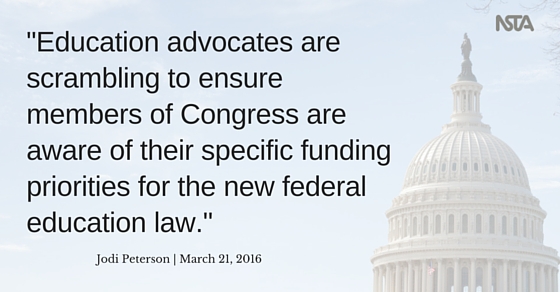Legislative Update
FY2017 Funding, ESSA and More
By Jodi Peterson
Posted on 2016-03-21
There has been a lot of activity on Capitol Hill with FY2017 appropriations, the new federal education law ESSA, and at the Department of Education.
The Race is on for FY2017 Appropriations
It’s not clear where and if the political winds will be blowing (and if they will knock out the regular appropriations process for FY2017 programs), but education advocates are scrambling to ensure members of Congress are aware of their specific funding priorities for the new federal education law, the Every Student Succeeds Act.
In a letter to Appropriations leaders, the STEM Education Coalition (which NSTA chairs) is asking Congress to fund ESSA Title II at the authorized level of $2.25 billion, support full funding for Title IV programs at $1.65 billion, fund $10 million for the STEM Master Teacher Corps, and to support the proposal of $100m for the new Computer Science for All. Read the Coalition’s letter to Congress.
NSTA is also part of a new coalition that is seeking full funding ($1.65 billion) for the ESSA Title IV A, Student Support and Academic Enrichment Grants. This flexible block grant, which is authorized at $1.65 billion in FY 2017, authorizes activities in three broad areas:
1) Providing students with a well-rounded education (e.g. college and career counseling, STEM, arts, civics, IB/AP)
2) Supporting safe and healthy students (e.g. comprehensive school mental health, drug and violence prevention, training on trauma-informed practices, health and physical education) and
3) Supporting the effective use of technology (professional development, blended learning, devices).
Specifically, in regards to the use of Title IV A funds for STEM, districts and states can use grant monies to expand high-quality STEM courses; increase access to STEM for underserved and at risk student populations; support the participation of students in STEM nonprofit competitions (such as robotics, science research, invention, mathematics, computer science, and technology competitions); provide hands-on learning opportunities in STEM; integrate other academic subjects, including the arts, into STEM subject programs; create or enhance STEM specialty schools; integrate classroom based and afterschool and informal STEM instruction; and expand environmental education.
The President’s budget request calls for funding of only $500 million for these grants, and suggests the funds should be competitive. Advocates, including NSTA, believe this amount is “grossly inadequate,” and is meeting with appropriators with this message. Read the letter from 75 groups, including NSTA, seeking robust funding for Title IV.
New Resources on Every Student Succeeds Act
The negotiated rulemaking panel for the ESSA will meet the week of March 21 in Washington, DC. Take a look at the agenda, and more about this process.
The U.S. Department of Education released a new ESSA FAQ document that highlights accountability system transitions for states with No Child Left Behind (NCLB) waiver flexibility, and addresses changes to Title I, Title II, and Title III programs.
The National Education Association plans to spend up to $5 million on ESSA implementation. Read more here.
The Council of Chief State School Officers released a guide for states looking to redesign or refine their teacher evaluation systems under the Every Student Succeeds Act.
Because of changes to Title I in ESSA, some states will lose more Title I funding than other states, as much as 1 percent, says Education Week, Read more.
Senate Introduces Bill on Career and Technical Education
The CTE Excellence and Equity Act would provide federal funding through a competitive grant program to support innovative approaches to redesigning the high school experience for students as schools develop curriculum, assess student performance and teach workplace skills through job shadowing, internships and apprenticeships. The bill would amend the Carl D. Perkins Career and Technical Education Act of 2006, which is expected to be considered by the Senate Health, Education, Labor and Pensions Committee this year.
Senate Confirms New Department of Education Secretary
Last week the U.S. Senate voted 49 to 40 to confirm John B. King Jr. as the nation’s education secretary. King has served as acting secretary since Arne Duncan stepped down in December.
During the Senate confirmation hearing, King faced many questions about the Department’s role in implementing ESSA, and the need to balance new state flexibility with the responsibility states now have to address underperforming schools and students.
In related news, Former Education Secretary Arne Duncan has joined the Emerson Collective to help disconnected young adults in Chicago.
Computer Science Advocates Form New Coalition
And finally, a group of business and non-governmental groups, including Amazon, Code.org, Facebook, Google, Hewlett Packard Enterprise, IBM, Microsoft and TechNet, have formed a new coalition in support of computer science. Read more about the Computer Science Education Coalition.
Jodi Peterson is Assistant Executive Director of Legislative Affairs for the National Science Teachers Association (NSTA) and Chair of the STEM Education Coalition. e-mail Peterson at jpeterson@nsta.org; follow her on Twitter at @stemedadvocate.
The mission of NSTA is to promote excellence and innovation in science teaching and learning for all.
Follow NSTA
Disclaimer: The views expressed in this blog post are those of the author(s) and do not necessarily reflect the official position of the National Science Teaching Association (NSTA).



